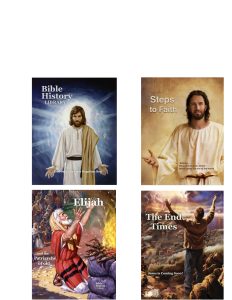
Welcome to the Bible History Library Ministry
Our mission is to spread the teachings of the Bible, enlightening people about end-time events and the everlasting gospel of Jesus Christ. You can join our outreach by distributing our specially designed booklets in places like gas stations, laundromats, and restaurants. These booklets are about half the size of our full-length books but pack the full message in an accessible format.
Engage with Us
We recognize that some individuals are naturally more outgoing and are ideally suited to distribute and maintain our materials. Our books are not just texts; they are beautifully illustrated works of art with profound messages, which makes them somewhat costly to produce.
If you feel called to support this ministry, we invite you to contribute. We don’t engage in traditional fundraising. Instead, we rely on faith, praying to our Father for our needs, and we trust that He will move hearts to support us through monthly donations. Every penny donated goes directly into our service, as we have no paid administrative staff.
Pray with Us
We also deeply value your prayers. Daily, we see hundreds of people introduced to the Bible and its themes. We believe that only through the Holy Spirit can true heart change occur. Your prayers for those who encounter our materials are invaluable.
Join us in this spiritual journey, spreading the word, and supporting the message through your generosity and prayers.
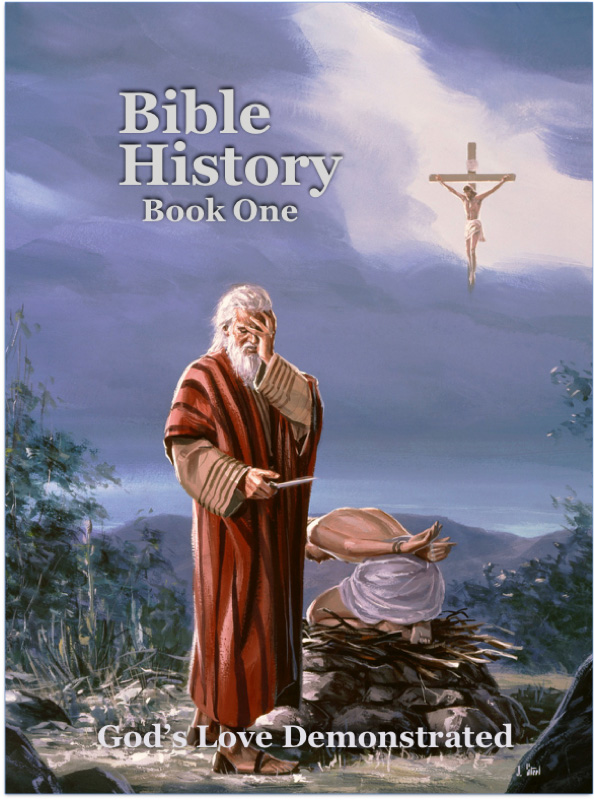
The first three paragraphs:
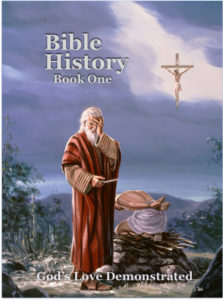 “God is love.” 1 John 4:16. His nature, His law, is love. It ever has been; it ever will be. “The high and lofty One that inhabiteth eternity,” whose “ways are everlasting,” changeth not. With Him “is no variableness, neither shadow of turning.” Isaiah 57:15; Habakkuk 3:6; James 1:17. PP 33.1
“God is love.” 1 John 4:16. His nature, His law, is love. It ever has been; it ever will be. “The high and lofty One that inhabiteth eternity,” whose “ways are everlasting,” changeth not. With Him “is no variableness, neither shadow of turning.” Isaiah 57:15; Habakkuk 3:6; James 1:17. PP 33.1
Every manifestation of creative power is an expression of infinite love. The sovereignty of God involves fullness of blessing to all created beings. The psalmist says: PP 33.2
“Strong is Thy hand, and high is Thy right hand.
Righteousness and judgment are the foundation of Thy throne:
Mercy and truth go before Thy face.
Blessed is the people that know the joyful sound:
They walk, O Lord, in the light of Thy countenance.
In Thy name do they rejoice all the day:
And in Thy righteousness are they exalted.
For Thou art the glory of their strength: …
For our shield belongeth unto Jehovah,
And our king to the Holy One.” PP 33.3
The first two paragraphs:
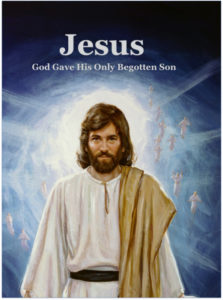 “His name shall be called Immanuel, … God with us.” “The light of the knowledge of the glory of God” is seen “in the face of Jesus Christ.” From the days of eternity the Lord Jesus Christ was one with the Father; He was “the image of God,” the image of His greatness and majesty, “the outshining of His glory.” It was to manifest this glory that He came to our world. To this sin-darkened earth He came to reveal the light of God’s love,—to be “God with us.” Therefore it was prophesied of Him, “His name shall be called Immanuel.” DA 19.1
“His name shall be called Immanuel, … God with us.” “The light of the knowledge of the glory of God” is seen “in the face of Jesus Christ.” From the days of eternity the Lord Jesus Christ was one with the Father; He was “the image of God,” the image of His greatness and majesty, “the outshining of His glory.” It was to manifest this glory that He came to our world. To this sin-darkened earth He came to reveal the light of God’s love,—to be “God with us.” Therefore it was prophesied of Him, “His name shall be called Immanuel.” DA 19.1
“By coming to dwell with us, Jesus was to reveal God both to men and to angels. He was the Word of God,—God’s thought made audible. In His prayer for His disciples He says, “I have declared unto them Thy name,”—“merciful and gracious, long-suffering, and abundant in goodness and truth,”—“that the love wherewith Thou hast loved Me may be in them, and I in them.” But not alone for His earthborn children was this revelation given. Our little world is the lesson book of the universe. God’s wonderful purpose of grace, the mystery of redeeming love, is the theme into which “angels desire to look,” and it will be their study throughout endless ages. Both the redeemed and the unfallen beings will find in the cross of Christ their science and their song. It will be seen that the glory shining in the face of Jesus is the glory of self-sacrificing love. In the light from Calvary it will be seen that the law of self-renouncing love is the law of life for earth and heaven; that the love which “seeketh not her own” has its source in the heart of God; and that in the meek and lowly One is manifested the character of Him who dwelleth in the light which no man can approach unto.” DA 19.2
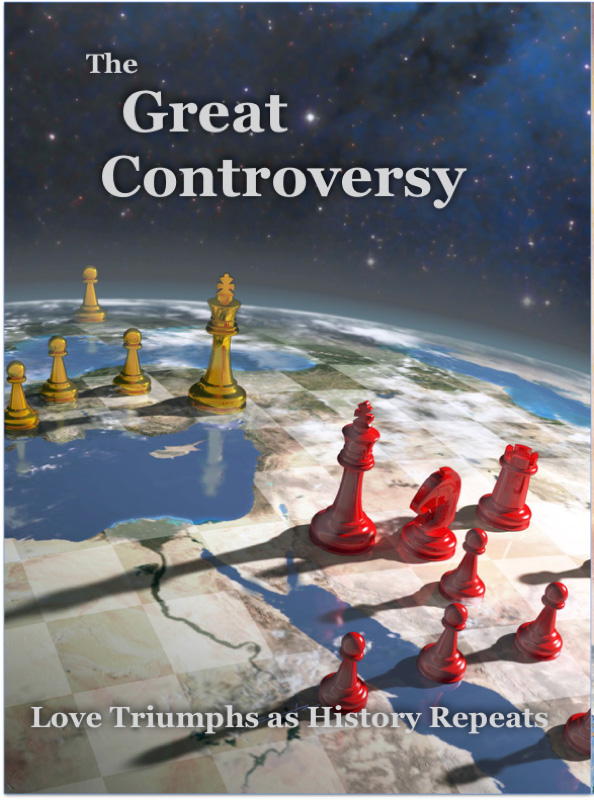
The first two paragraphs:
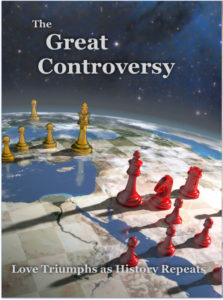 “If thou hadst known, even thou, at least in this thy day, the things which belong unto thy peace! but now they are hid from thine eyes. For the days shall come upon thee, that thine enemies shall cast a trench about thee, and compass thee round, and keep thee in on every side, and shall lay thee even with the ground, and thy children within thee; and they shall not leave in thee one stone upon another; because thou knewest not the time of thy visitation.” Luke 19:42-44. GC 17.1
“If thou hadst known, even thou, at least in this thy day, the things which belong unto thy peace! but now they are hid from thine eyes. For the days shall come upon thee, that thine enemies shall cast a trench about thee, and compass thee round, and keep thee in on every side, and shall lay thee even with the ground, and thy children within thee; and they shall not leave in thee one stone upon another; because thou knewest not the time of thy visitation.” Luke 19:42-44. GC 17.1
“From the crest of Olivet, Jesus looked upon Jerusalem. Fair and peaceful was the scene spread out before Him. It was the season of the Passover, and from all lands the children of Jacob had gathered there to celebrate the great national festival. In the midst of gardens and vineyards, and green slopes studded with pilgrims’ tents, rose the terraced hills, the stately palaces, and massive bulwarks of Israel’s capital. The daughter of Zion seemed in her pride to say, I sit a queen and shall see no sorrow; as lovely then, and deeming herself as secure in Heaven’s favor, as when, ages before, the royal minstrel sang: “Beautiful for situation, the joy of the whole earth, is Mount Zion, … the city of the great King.” Psalm 48:2. In full view were the magnificent buildings of the temple. The rays of the setting sun lighted up the snowy whiteness of its marble walls and gleamed from golden gate and tower and pinnacle. “The perfection of beauty” it stood, the pride of the Jewish nation. What child of Israel could gaze upon the scene without a thrill of joy and admiration! But far other thoughts occupied the mind of Jesus. “When He was come near, He beheld the city, and wept over it.” Luke 19:41. Amid the universal rejoicing of the triumphal entry, while palm branches waved, while glad hosannas awoke the echoes of the hills, and thousands of voices declared Him king, the world’s Redeemer was overwhelmed with a sudden and mysterious sorrow. He, the Son of God, the Promised One of Israel, whose power had conquered death and called its captives from the grave, was in tears, not of ordinary grief, but of intense, irrepressible agony.” GC 17.2
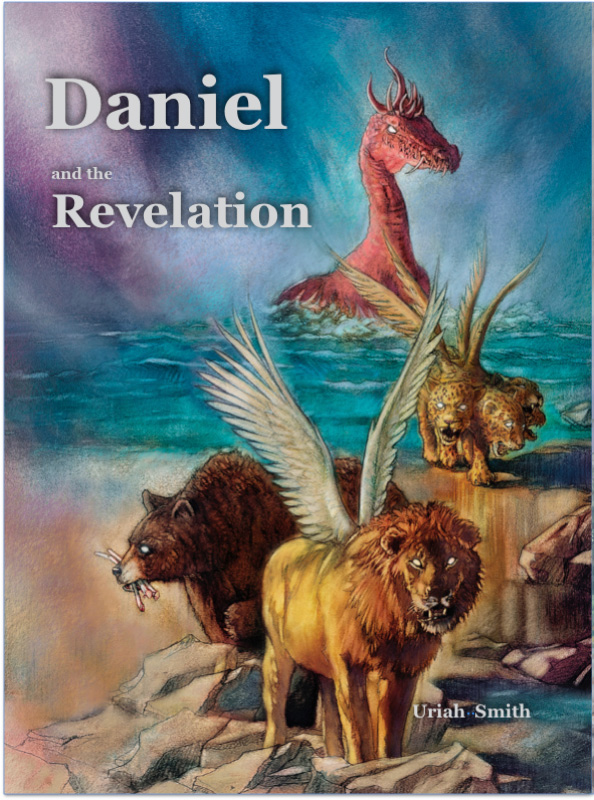
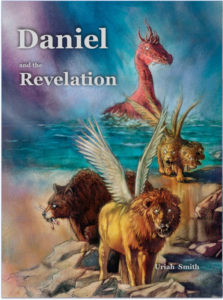
“That the book of Daniel was written by the person whose name it bears, there is no reason to doubt. Ezekiel, who was contemporary with Daniel, bears testimony, through the spirit of prophecy, to his piety and uprightness, ranking him in this respect with Noah and Job: “Or if I send a pestilence into that land, and pour out my fury upon it in blood, to cut off from it man and beast; though Noah, Daniel, and Job were in it, as I live, saith the Lord God, they shall deliver neither son nor daughter; they shall but deliver their own souls by their righteousness.” Eze.14:19,20. His wisdom, also, even at that early day, had become proverbial, as appears from the same writer. To the prince of Tyrus he was directed by the Lord to say, “Behold, thou art wiser than Daniel; there is no secret that they can hide from thee.” Eze.28:3. But above all, our Lord recognized him as a prophet of God, and bade his disciples understand the predictions given through him for the benefit of his church: “When ye therefore shall see the abomination of desolation, spoken of by Daniel the prophet, stand in the holy place (whoso readeth, let him understand), then let them which be in Judea flee into the mountains.” Matt.24:15,16.” {1897 UrS, DAR, 1st paragraph of the introduction to Daniel}
“The Revelation, usually termed “The Apocalypse,” from its Greek name, meaning “a disclosure, a revelation,” has been described to be “a panorama of the glory of Christ.” In the Evangelists we have the record of his humiliation, his condescension, his toil and sufferings, his patience, his mockings and scourgings by those who should have done him reverence, and finally his death upon the shameful cross, – a death esteemed in that age to be the most ignominious that men could inflict. In the Revelation we have the gospel of his enthronement in glory, his association with the Father upon the throne of universal dominion, his overruling providence among the nations of the earth, and his coming again, not a homeless stranger, but in power and great glory, to punish his enemies and reward his followers. “A voice has cried from the wilderness, ‘Behold the Lamb of God;’ a voice will soon proclaim from heaven, ‘Behold the Lion of the tribe of Judah!'” {1897 UrS, DAR, 1st paragraph of the introduction to the Revelation}



 “God is love.” 1 John 4:16. His nature, His law, is love. It ever has been; it ever will be. “The high and lofty One that inhabiteth eternity,” whose “ways are everlasting,” changeth not. With Him “is no variableness, neither shadow of turning.” Isaiah 57:15; Habakkuk 3:6; James 1:17.
“God is love.” 1 John 4:16. His nature, His law, is love. It ever has been; it ever will be. “The high and lofty One that inhabiteth eternity,” whose “ways are everlasting,” changeth not. With Him “is no variableness, neither shadow of turning.” Isaiah 57:15; Habakkuk 3:6; James 1:17.  “His name shall be called Immanuel, … God with us.” “The light of the knowledge of the glory of God” is seen “in the face of Jesus Christ.” From the days of eternity the Lord Jesus Christ was one with the Father; He was “the image of God,” the image of His greatness and majesty, “the outshining of His glory.” It was to manifest this glory that He came to our world. To this sin-darkened earth He came to reveal the light of God’s love,—to be “God with us.” Therefore it was prophesied of Him, “His name shall be called Immanuel.”
“His name shall be called Immanuel, … God with us.” “The light of the knowledge of the glory of God” is seen “in the face of Jesus Christ.” From the days of eternity the Lord Jesus Christ was one with the Father; He was “the image of God,” the image of His greatness and majesty, “the outshining of His glory.” It was to manifest this glory that He came to our world. To this sin-darkened earth He came to reveal the light of God’s love,—to be “God with us.” Therefore it was prophesied of Him, “His name shall be called Immanuel.” 
 “If thou hadst known, even thou, at least in this thy day, the things which belong unto thy peace! but now they are hid from thine eyes. For the days shall come upon thee, that thine enemies shall cast a trench about thee, and compass thee round, and keep thee in on every side, and shall lay thee even with the ground, and thy children within thee; and they shall not leave in thee one stone upon another; because thou knewest not the time of thy visitation.” Luke 19:42-44.
“If thou hadst known, even thou, at least in this thy day, the things which belong unto thy peace! but now they are hid from thine eyes. For the days shall come upon thee, that thine enemies shall cast a trench about thee, and compass thee round, and keep thee in on every side, and shall lay thee even with the ground, and thy children within thee; and they shall not leave in thee one stone upon another; because thou knewest not the time of thy visitation.” Luke 19:42-44. 
 “That the book of Daniel was written by the person whose name it bears, there is no reason to doubt. Ezekiel, who was contemporary with Daniel, bears testimony, through the spirit of prophecy, to his piety and uprightness, ranking him in this respect with Noah and Job: “Or if I send a pestilence into that land, and pour out my fury upon it in blood, to cut off from it man and beast; though Noah, Daniel, and Job were in it, as I live, saith the Lord God, they shall deliver neither son nor daughter; they shall but deliver their own souls by their righteousness.” Eze.14:19,20. His wisdom, also, even at that early day, had become proverbial, as appears from the same writer. To the prince of Tyrus he was directed by the Lord to say, “Behold, thou art wiser than Daniel; there is no secret that they can hide from thee.” Eze.28:3. But above all, our Lord recognized him as a prophet of God, and bade his disciples understand the predictions given through him for the benefit of his church: “When ye therefore shall see the abomination of desolation, spoken of by Daniel the prophet, stand in the holy place (whoso readeth, let him understand), then let them which be in Judea flee into the mountains.” Matt.24:15,16.” {1897 UrS, DAR, 1st paragraph of the introduction to Daniel}
“That the book of Daniel was written by the person whose name it bears, there is no reason to doubt. Ezekiel, who was contemporary with Daniel, bears testimony, through the spirit of prophecy, to his piety and uprightness, ranking him in this respect with Noah and Job: “Or if I send a pestilence into that land, and pour out my fury upon it in blood, to cut off from it man and beast; though Noah, Daniel, and Job were in it, as I live, saith the Lord God, they shall deliver neither son nor daughter; they shall but deliver their own souls by their righteousness.” Eze.14:19,20. His wisdom, also, even at that early day, had become proverbial, as appears from the same writer. To the prince of Tyrus he was directed by the Lord to say, “Behold, thou art wiser than Daniel; there is no secret that they can hide from thee.” Eze.28:3. But above all, our Lord recognized him as a prophet of God, and bade his disciples understand the predictions given through him for the benefit of his church: “When ye therefore shall see the abomination of desolation, spoken of by Daniel the prophet, stand in the holy place (whoso readeth, let him understand), then let them which be in Judea flee into the mountains.” Matt.24:15,16.” {1897 UrS, DAR, 1st paragraph of the introduction to Daniel}